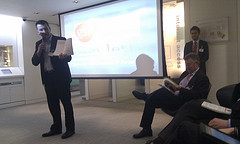When I was a therapist and then a consultant, I prided myself on my practicality, on being down-to-earth. I still do.  This often brought me into conflict with colleagues who loved abstractions and built their work and life around playing with them. Why shouldn't people focus on concepts? In principle, I want people, colleagues and clients alike, to do what they think is right and best.
This often brought me into conflict with colleagues who loved abstractions and built their work and life around playing with them. Why shouldn't people focus on concepts? In principle, I want people, colleagues and clients alike, to do what they think is right and best.
The question really comes down to what is right and best. If you get that wrong, then perhaps you might find yourself in trouble. Conceptual input means starting from ideas that are part of a theory. Or perhaps it means applying a paradigm that is popular. This idea-based engagement always left me uncomfortable. Still does.
When I tried to deal with some management mess, I would typically focus on the goals that were being pursued and the work that everyone was doing, or ought to be doing, to achieve those goals. Complex work requires large organizations with lots of people and (like it or not) a hierarchy of some sort. The challenge always is how to integrate the differing work of lots of people and become clear about their relationships in regard to getting that work done.
At the end of the day, the consulting work was only successful from my perspective and for my client (invariably the CEO) if the mess went away, if staff were getting on with their work and enjoying it, and if there was progress in regard to goals and plans.
I found that there were no recipes for success. The only way to achieve a good result was to listen to everyone and see their point of view.
"Hold on!" you may say. "Didn't you use THEE frameworks? Aren't they a paradigm? Isn't that your theory?" Well, that is a bit like asking whether I used the English language. I certainly discussed topics that had been organized in THEE. But every time I use a THEE framework I am testing it out with myself and with the person I am talking to. My goal is to make sure that the two of us are referring to the same specific thing in the same way. That often required me to avoid using my THEE-names, and use their terms. That was fine by me.
Getting back to the process now.
Once their viewpoint was valued and their ideas were validated, tensions dropped and good relations developed. No practical solution existed at this point, but the problems were clear and the basis for finding a resolution and getting it accepted was in place.
In devising practical solutions, I used THEE frameworks where I had them, not necessarily explaining them in a detailed fundamental way but picking and choosing from the principles to suit the situation and fit the mindset of whoever I was talking with. Where I hadn't an explicit framework, I think I intuitively used one nevertheless, or perhaps it was being used and explained to me by my client. Or perhaps it was a widely accepted model or principle within the management consulting fraternity that had an as-yet-unknown location in THEE.
However, looking back now, the crucial feature in solutions seemed to be the values that were in the back of my mind and in the forefront of my explanations.
- I was trying to find a practical solution that was fair to those involved, and positively experienced as fair. People are reluctant to actively support unfairness.
- I explained radical solutions in a way that reduced burdens and enabled easy learning and spontaneity.
- Efficiency was something I used as a lever. Few managers are against that.
- I regularly counselled patience, because introducing new practices or new relationships cannot occur overnight.
- I tried to develop a sense of adventure and the necessary courage to try something new.
- I explained the importance of trust in working together and what trust means in an organizational context—it's not the same as in a marriage!
- Creativity requires a move from describing jobs in terms of action to specifying general responsibilities. That then allows the creation of purposes to meet issues and challenges.
- I recall making efforts to ensure balance amongst conflicting pressures and needs and not letting people ignore obvious pressures on others.
- I emphasized that arrangements that played to personal strengths would permit firm but compassionate responses at times of stress.
Do I need to go on?
Solutions based on THEE frameworks were practical because they embodied, again and again: fairness, integrity, spontaneity, efficiency, trust, honesty, responsibility, clarity, purpose, creativity, wholeness, compassion.
These are humanity's ultimate values. The fundamental experiences that everyone seeks, that mankind has always sought. If we want to identify what is good or what goodness entails, this is how we describe and explain it.
Remember that these values were never the focus—the focus was always the problem and the practical solution. In my experience this is unusual for those who start with abstractions. They focus on abstract values and sound wonderful. But the all-too-common end-result of following value-preachers has been failure and horrors.
Ultimate values are not only possible, they are essential, but they cannot exist on their own or via ideologies. They are impossible within a resolute relativism, as Charles Frankel argued so persuasively over 50 years ago. But they are only the key to supreme success when embedded within everyday practical living and the pursuit of sensible goals in the world as it is.
Exactly how this works within us is being developed in a Your Better Self framework that will be posted early next year.
Perseverance furthers.
WK
About
Warren Kinston